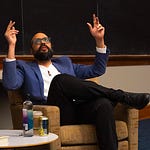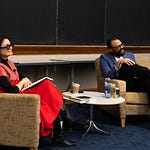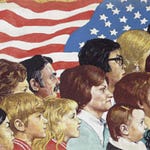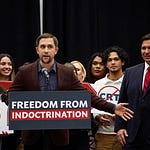This is the second in our occasional series on Rethinking the Canon. Is there value in reading the classics at a time when they are increasingly viewed as unrepresentative texts that don’t speak to the diverse experiences of modern students? This week Amna talks with Roosevelt Montás, senior lecturer in American Studies and English at Columbia University.
FULL TRANSCRIPT
AMNA KHALID:
A liberal education is one that takes the complicated condition of human freedom seriously, and addresses itself to its dilemmas and to the urgency of its lived experience. To think and reason through these kinds of questions is to learn to live with them in an honest and ongoing way.
That was an excerpt from Roosevelt Montás’s book, “Rescuing Socrates: How the Great Books Changed My Life and Why They Matter for a New Generation.” Roosevelt Montás, who emigrated from the Dominican Republic as a teenager, is now a senior lecturer in American Studies and English at Columbia University. He specializes in antebellum American literature and intellectual history. He’s also spent 10 years as the director of the Center for the Core Curriculum at Columbia, teaching and running what is often called the “Great Books” program.
I started our conversation by asking him if he could give our listeners a sense of what motivated him to write so passionately about Great Books.
ROOSEVELT MONTÁS: The book is a meditation on my experience of liberal education and an argument about why liberal education based on the study of Great Books matters today. I draw on my own biographical, personal experience of encountering the Great Books as an undergraduate, but also on my experience teaching them and encountering the kind of struggles and challenges of organizing undergraduate, general education around the study of books that are often old and often don't speak directly to the issues that are most salient in people's daily, lived experience. So, the book tries to take in my personal, intellectual, institutional experience and put it all together into an argument about why reading these books seriously with undergraduates matters today.
KHALID: Let's peel back what this term “Western canon” means. One of the things that I have found a little disturbing of late is how quickly people will jump to calling something “white supremacy” or just “white” for that matter. And if we look at the Greco-Roman tradition, how in the Mediterranean region these ideas were coming from different places. Once you start looking to the historical roots of these ideas, my understanding as a historian is that it complicates the notion of even what is considered white. Can you speak a little bit about what is loosely referred to as the Western tradition and Western canon and where the roots of some of the key traditions lie?
MONTÁS: So, you know, “Western” — I remember when I first began to encounter that term, “Western,” when I went to college — I would always say, you know, west of what?
KHALID: (Laughs)
MONTÁS: When you name a direction, it only makes sense from a particular point of view. So, west of what? But often people use “Western” synonymously with “European.” When you think about the Western canon, you're not thinking about a European canon. Obviously, some very, very important roots of what came to be the texts that we associate with the Western canon lie in the ancient Mediterranean, in the — what we now call the Middle East, biblical texts in North Africa. One of the central figures I deal with in my book and one of the thinkers that has been most influential in modern development is St. Augustine. You might hear the name St. Augustine and not realize that we're talking about a North African, Berber man, who turns out to be the towering intellect in the Christian tradition and in Western philosophy, a major major figure. And of course, you have the biblical texts that originate in a matrix of oral traditions that are not by any stretch European, although they do end up having a very powerful influence in Europe. So when we think about the West, we should not be thinking narrowly, geographically. I like to think about it as including the lands and peoples and cultures and traditions around the Mediterranean Sea. That loose tradition ends up, first of all, leaving a textual record, leaving a genealogy of text and debates that we can trace today. And we're very fortunate and lucky that we can have access to those texts.
Then there's a second term about “canon.” Again, you can understand why people resist the idea of canon, why people resist the idea that there is a set of text that is handed down to you from on high by some intellectual or traditional cultural authority that says these are the essential texts, this is what matters. But if I can quote an old friend of mine, who said about the Literature Humanities syllabus at Columbia's first year requirement — this is this kind of a Great Books course that all first years take, and it's been around for over 80 years now, this course. Every year you read about 25 books in it, but over the course of the history of the course, there have been like 150 or so books that have, at one time or another, been in the list. So he says that if Literature Humanities teachers teach us a canon, it's a loose canon.
KHALID: (Laughs)
MONTÁS: So, I think we should think of the canon as a loose canon. That is, it's not a fixed, unalterable list, but rather a pretty large and permeable collection of text and conversations. And sometimes we discover new text. Sometimes we reinterpret text. Sometimes texts that we have ignored for a while regain a new prominence and a new relevance. So it's always something that's under revision. It's always under construction. You know, even if what you want to do is understand the roots of male domination, or if you want to understand the roots of elite exploitation of the proletariat, if you want to understand the root of racial subjugation, that's the place to look, both for the traditions that have sustained those morally objectionable practices, but also for the discourses that have challenged those — you know, human rights and justice and liberation. All of those also find their roots in that tradition of contestation, that tradition of debate. You know, the reason why we read Aristotle is not because he was the student of Plato and he celebrates Plato. The reason we read Aristotle is because he disagreed and refuted Plato so profoundly. It is a tradition of debate and dispute, contestation, it is not a tradition of parroting an orthodoxy.
KHALID: It makes me reflect on my own experience growing up in Pakistan and much of what I read was what is seen as the Western canon. And like you said, it is a lightning rod when you're first introduced to it and the idea of how central that was in the process of colonization. It can elicit a response, which is almost a rejection. But upon further exploration, what stood out to me was that, embodied within the canon, is this tension, right? This tension of what constitutes an orthodoxy and what then overturns it and how this relationship is dynamic, that it's constantly moving. You know, I like to think of the canon as like an organism. It's alive.
MONTÁS: Yeah.
KHALID: It's constantly dynamic and it's developing. It's got several limbs which jut out, and some get chopped off and then get reattached. And it's kind of an octopus of sorts. And you talk about that in your book, you talk about how you worked in the Great Books course to include Gandhi and how you worked with students on Gandhi. Can you reflect a little bit on that process of including what would count as non-Western writers within the canon?
MONTÁS: Yeah, Gandhi is a great example, and I've argued that Gandhi belonged in a course that's ostensibly a Western course, and that Gandhi holds a special place in that because Gandhi is kind of a bridge figure. Gandhi is someone who is rooted in an ancient, venerable, profound, philosophical, ethical, spiritual tradition that is quite alien to the premises that organized the Western philosophical, ethical approach. Yet, Gandhi is deeply versed, deeply influenced, and a masterful deployer of lots of things that you find in the Western tradition. And you know, he was the first to acknowledge the influence of people like Ruskin and Thoreau and Tolstoy and Jesus. Gandhi is this great, voracious intellect and ethical thinker. So, I began to read Gandhi on my own kind of after graduate school as part of my own curiosity and my own sense of what is there in other ancient traditions? What light on the contemporary world can those ancient texts throw? So, Gandhi was really special in this way because he was a kind of hinge between something I knew and understood quite well and this other thing.
Then I began teaching it. I said, I wonder how this would work in the classroom, how we would work with students who have now spent two years reading the so-called “Western classics.” How would it work for us to think about Gandhi, both in the context of that tradition we have seen, but also for the ways in which he is coming at questions we have been dealing with for a long time from an entirely different perspective? And it worked really, really well in the classroom. Students often felt like I did when I read them on my own, that Gandhi enriched their understanding of their own tradition in a powerful way, and that it opened up this other way of thinking, this other ethical universe. Enough people had good experiences with it that we made a proposal — let's make this a mandatory part of the curriculum. So Gandhi's been there maybe 10 years now. And it's an example of this thing where we don't read the Western canon because it's Western. You know, we don't read these texts because they're somehow ours and therefore better than others. No, we read these texts because they matter. We read these texts because they're genuinely useful in our understanding of the contemporary world. It's a trite thing to say, but often overlooked that the present emerges from the past. That's just the way it works. The present comes from, is organically linked with, the past. The past is therefore very much worth our attention.
KHALID: So Roosevelt, let me ask you this question, which is, what makes a classic text? When does a text become something that is worthy of being called a classic?
MONTÁS: That is such a good question, and one that has inspired a lot of thought and writing, and I know several books that are dedicated to answering this question, and I've been part of many faculty conversations on this question. And I even know of one instance in which a school that wanted to put together a course on classics came up with a set of criteria in which every book got a score. Criteria 1 from 1 to 5 and then criteria 2 from 1 to 5. And then when you tally them up and you get a raw score of the class — and this is how they decided and —
KHALID: — the height of neoliberalism.
MONTÁS: Exactly. Fine, if that's what you're going to do, fine. But one thing you can say about a classic book is that it's a book that has the capacity to speak to many different kinds of people in many different kinds of historical circumstances. Generation after generation have found them to be illuminating, have found them to be relevant, have found them to be meaningful. That speaks to a quality in the book, or could be a statue, could be a painting, could be any kind of human expression, but it speaks to some quality that transcends the historical conditions of its creation. Plato is meaningful to me, not because he was like an Athenian aristocrat in a turbulent period in Greece. I don't care about that, doesn't mean anything to me. There's something else that Plato gets at that does mean something to me as a Dominican immigrant in New York in the 21st century, a kind of gesture towards universality, connecting and illuminating something that is fundamental to the human experience that I have and the human experience that Plato had. That empirically proven capacity to speak to many people across different time periods, across differing historical circumstances is one of the characteristics of a classic. It does mean that it's much easier to tell if an old book meets this criterion than a new book, right? And I don't think we are good at figuring out what will be the texts from today that are going to continue to be relevant and speak to people in that unimaginable future. There is also their complexity. They’re multivocal. They have this ideological and human complexity to them that makes them resistant to ideological takeover. You can't just deploy them as tools of indoctrination. They also tend to be demanding and to reward effort. That is, they are rich in a way that you can chew them, you can discuss them, you can think about them and they keep giving. Having said all that, you could not come up with a list of, these are it, these are the classics. I think that category is one that one is always reassessing, one is always rethinking. And that's OK. I don't think we need to have an investment in a particular set of texts as being the ones.
KHALID: So, there are a couple of things that are coming to my mind, actually, as you're speaking about this, which is, the conversation about what makes a classic, the ability to speak to several generations and across identity markers in a particular time. Somehow, as you're talking about it (and I don't know why I haven't thought about this before), but it's kind of a no-brainer that these are texts that are produced out of moments of cultural contact, cultural clashes, cultural exchange, right? You talk about Gandhi. Even Gandhi — people like to think about him as this Hindu, ascetic figure, but his intellectual development is deeply informed, like you said, by the Western tradition and a deep reading of key Western thinkers, while also incorporating Eastern philosophy. What stands out in terms of classics is that they're often born out of this need to contend with different cultural influences. Can you speak more to that?
MONTÁS: The way that the human mind works is by pollination and cross-pollination, and great moments of cultural transformation are always the product of incorporating the new, incorporating what is alien, incorporating what challenges preconceived paradigms. You know, you might add that as another characteristic of classics, right? That they're often texts that are produced in the crux of large conflicts. The writer couldn't sleep well, and you may not be able to sleep well after you read them. They're somehow contending with and incorporating newness into a new way of seeing the world. You can’t have great literature without conflict, and you can't have great philosophy without argument. One thinks of Hegel's notion that history and thought proceeds through this agonistic context between one proposition and its opposite and then finding a synthesis, finding a way — a larger understanding that incorporates without negating, incorporates both, incorporates the opposition. There may be an instructive lesson there in the so-called “Canon Wars,” and I wouldn't be the first one to point out that one way to approach it is to teach the war, is to teach the conflict. You know, people are fighting over what should we teach? That itself becoming an object of instruction. Let's look at why we fight over these texts. What is it in them? And that, of course, means that we have to read the texts, but it also means that sometimes we read the texts in order to refute them. We certainly cannot refute Plato if we don't read Plato. Though I have read many an undergraduate paper that tries to do that.
KHALID: Well, you know the crunch of time and the deadline can produce great genius. So we're right now getting to the heart of what troubles me these days. I find so much of the push for diversity — which I'm in favor of. I think contending with difference, engaging with difference is a useful exercise and one that we should push our students to do. But then we're in this moment where I find that the push for diversity is simultaneously pushing out these texts that are produced out of precisely that kind of deep conflict and deep contention with difference. And so it's doing a disservice to these students to not read them. But how do we talk to people when they fundamentally disagree with the very basis of what we consider knowledge?
MONTÁS: This worries me a lot too: this, I think, facile rejection of the tradition because it's not representative because, you know, it doesn't have my voices in it, it doesn't have any Dominicans in it. The facile rejection of the tradition simply on identitarian grounds. And along with that comes this intellectually condescending attitude that says that, say, young people today who come from a diversity of backgrounds can only relate to texts in which they find these particular aspects of their identity that in our cultural moment are marginalized. Only through those can they connect authentically with a text. It is such an epistemologically reductive, almost violent, assumption to make. Sure, those aspects will speak very powerfully to them. But those aspects are not the only ones in their identity that matter and that matter to them. And in fact, those aspects only gain significance in the context of a broader humanity, in the context of a broader commonality. There is a kind of pernicious logic that says in order to acknowledge and honor and recognize our diversity, we have to reject the canon, we have to not read that and instead read this other thing. In fact, what we need to do is to read both. What we need to understand is that the canon now incorporates diversity. The canon now reflects a different set of voices, a different set of concerns, a different historical consciousness. And that has to be part of what we study. And we then study the canon because it is the antecedent. It is the ground from which this new thing emerges. It is the ground from which our concern and valuing of diversity emerges. It is the ground from which our tools with which we fight for social justice and equality emerge. The idea that we all deserve a voice in the conversation, that idea itself emerges from this tradition. When people are arguing for a diversification of the canon, they're often actually arguing for a presentist view of the canon. That is, they're actually arguing for us to merely read or study a material that has been produced in the last 60 or 70 years, and it's just not sufficient for a full education.
KHALID: Well, I mean, I couldn't agree more. As an historian, I feel like, in part, we are at this moment where we have an inability to appreciate these texts precisely because we've stopped valuing history and engaging with history. And then you also lose the ability to appreciate what you can gain from it, from studying it.
MONTÁS: Yeah. Yeah.
KHALID: And so, you do get into a very present-focused way of interpreting the world, which also becomes more and more literal-minded because you lose the appreciation of context for understanding something. All you know is the present context, and you evaluate everything by it. Roosevelt, what are some of the books that have spoken to you, perhaps even early on in your experience of coming to the U.S.? What were the texts that spoke to you and why?
MONTÁS: When I came to the United States, it was into the seventh grade and I didn't speak English. So I went into the New York City public school system and did two years in bilingual education with a heavy focus on English as a second language, but taking my subjects in Spanish. History and science and math were in Spanish. By the time I was a sophomore, my English was barely good enough to read a grown up book in English. And I found, outside of my house in Queens, next door neighbors were throwing away a bunch of books. Among them, I picked up a collection called The Last Days of Socrates. It had Socratic dialogues: “The Apology,” the “Phaedo,” the “Crito.” Dialogues that deal with the last days of Socrates’ life, including his defense before an Athenian jury. That book was really profoundly transformative for me. And one of the things that it opened for me was a way of understanding myself in this broader context. See, I was aware of the kind of cultural deprivation — that I was poor. We didn't speak English. We didn't have education. They don't understand the world, the grown-ups around me. So I was conscious of this kind of poverty that extended beyond material poverty, which I absolutely was experiencing as well. Reading Socrates and Plato just gave me this window into a kind of wealth, a kind of dignity, a kind of identity that was not dependent on my material resources, a kind of value.
Another text that I discuss at some length is St. Augustine, and in particular, the text that I read as a first year at Columbia, The Confessions, which is a spiritual autobiography where Augustine tells the story of how he became a Christian — of how he, through philosophy, came to a kind of higher conception of life and of the ultimate good that for him led him to Christianity. And I encountered that book at a time where I was myself grappling with questions of faith, with meaning, with: Is there a God? Is there evil? Why is there evil? What am I? Am I a Christian, am I what? And St. Augustine was the first believer I had met who was also a serious intellectual. And those two things in my mind could not coexist before. You were either a rational materialist or you were a blind-faith believer. So, he was the first time where I saw an intellectual inquiry with integrity into questions of faith. Interestingly, you know, I didn't walk away from Augustine converted to Christianity like he did, but I walked away from Augustine converted to the life of the mind. These are texts that were utterly meaningful to me, that in some ways set the course of my life. And they were not texts that dealt with the particularity of my experience. On the contrary, they were texts that dealt with the universality of my experience. The texts that really made the difference were these texts that allowed me to connect to something bigger, deeper, longer, older than my own experience and that in some way cut my experience down to size rather than enlarge it.
KHALID: I love the way you spoke about how it kind of cut you down to size. So much of the discourse today is about navel gazing and making us bigger than who we are. But so much of our meaning making is, I think, generative when we see ourselves as part of a tradition or part of a bigger whole, as opposed to seeing ourself as the whole. I can imagine a sophomore in high school who is not very comfortable with English finding this text of Socrates’ last days. That could not have been an easy or a comfortable read. I assume it would be difficult. It took you a while to engage and contend with, and it probably also produced lots of moments of discomfort. And one of the things you said earlier about what qualifies as a classic is that the text is rewarding.
MONTÁS: Yeah.
KHALID: Perhaps, if I'm not mistaken, you're referring to persisting through the discomfort it makes you feel at various levels and then finding it to be worthwhile.
MONTÁS: One of the revelations was that as hard as it was — as hard as it was to read it in English — it was not beyond me. There were ideas there that made sense to me. And even as a sophomore in high school, I felt the miracle of that. I felt the extraordinariness of that: that this thing that is high culture and complex philosophy and stands as some kind of pinnacle of cultural prestige, this is no big deal. I can read this. This is not beyond me. So this is a text that I teach every summer. I teach high school students who come from low income families and hope to be the first one in their families to attend college. Every summer, I teach a course for students in that demographic, and this is one of the texts I teach them. And it's something I see happening to them every single year where they are awakened to the fact that these ancient texts actually speak to them. These ancient texts are actually accessible to them. They actually have things to tell them, and they have things to respond. They are not beyond them. Another thing that it did for me was open a set of inquiries, made me ask questions, made me look things up. The things that were impenetrable to me turned out to actually be doors and windows through which I would travel. I've experienced it and I see it happening every year when I teach these high school students this text and texts like it.
KHALID: Thank you so much. It was wonderful to have this conversation with you. Thank you for joining us.
MONTÁS: Thank you, Amna.
KHALID: If you like what you heard today and want more thought provoking content, please become a paying subscriber to Booksmart Studios. Subscribers get transcripts, full interviews, and bonus segments. And before I sign off, I have a request: Please comment, rate, and share what you've heard here today. Our success here at Booksmart depends as much on you as on us. Banished is produced by Matthew Schwartz and Mike Vuolo. And I am Amna Khalid. Bye now.















Share this post